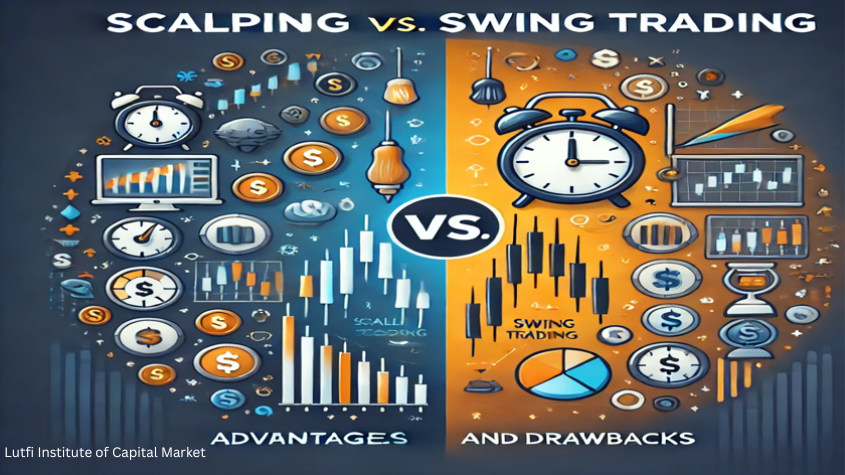Investors in the ever-changing realm of trading sometimes have to pick among several approaches that fit their objectives, risk tolerance, and market environment. Two often used techniques are swing trading and scalping. Here is the comprehensive guide about Scalping Vs Swing Trading.
Particularly in FOREX trading, commodity trading, and stock trading, every strategy has its advantages and pitfalls. The following article addresses the benefits and limitations of slashing and swing trading to guide your decision on tactics. You can learn the full details about Scalping Vs Swing Trading in the Pakistan from Online Institute LIOCM.
Scalping Instant gains, quick decisions:
Using a high-frequency trading approach, scalping seeks to benefit modestly from several transactions all day. Holding positions for seconds or minutes at a time, scalpers try to profit on minute market swings.
Benefits of Scalping:
1. Quick Returns: Scalpers generally close their deals in a few minutes, which lets quick profits realize. In FOREX trading, where pairings of currencies can show significant volatility, this approach is very tempting.
2. Less Market Exposure: Scalpers minimize the effect of negative price swings by holding deals for such a short period, so exposing them to market risks for a minimal time.
3. High Volume Trading: Scalping appeals to busy traders since the possibility of several trades during the day can result in notable cumulative profits if done properly.
Cons of Scalping:
1. High Transaction Costs: Frequent trading can result in large commissions and fees that would reduce earnings. For traders with minimal capital or in marketplaces with significant transaction costs, this makes scalping less practical.
2. Requires Intense Focus: Scalping calls for constant market attention, hence traders who cannot commit enough time to trade find it difficult.
3. Stressful Environment: Scalping’s fast-paced character might cause stress and the possibility of emotional decision-making that might compromise general performance.
Longer horizons and larger moves define swing trading:
Conversely, swing trading is a medium-term trading approach meant to grab more price swings over several days or weeks. To find ideal points of entrance and exit, swing traders examine market patterns using both technical analysis and fundamental analysis.
Advantages of Swing Trading:
1. Less Time Commitment: Swing traders do not have to have a continuous market-watching eye. Their ability to examine judgments on daily or weekly charts lets one have a more reasonable trading schedule.
2. Higher Profit Potential: Longer-term positions allow swing traders to profit from more significant price swings, therefore perhaps yielding more gains than scalping.
3. Improved Risk Management: Longer trading times allow swing traders to utilize larger stop-loss orders, so offering greater risk management than scalpers, who would have to make snap judgments under duress.
The Drawbacks of Swing Trading:
1. Greater Market Exposure: Swing traders run larger long-term market risks, so there is more possibility of negative price swings over their holding times.
2. Lower Trade Frequency: Reduced transaction frequency means swing traders could miss quick market swings or profitable possibilities scalpers would seize.
3. Requires Strong Analysis Skills: Strong technical analysis and fundamental analysis skills are therefore rather important for traders since successful swing trading depends on correct technical analysis and Fundamental analysis.
Last Thought :
Different kinds of traders should use scalping and swing trading since both have special advantages and disadvantages. Scalping can be the ideal choice if you can manage the strain and like quick-paced trading. Swing trading, however, can be more suitable if you want a more laid-back strategy with maybe higher gains.
When choosing amongst these approaches, ultimately your trading style, objectives, and risk tolerance will be quite important.
Combining these techniques into your whole wealth management plan will help you diversify your approach and maximize your trading performance in FOREX Trading, Commodity Trading, stock trading, and trade environments. We at Lutfi Institute of Capital Market provide tools and courses to let traders of all stripes hone their abilities and choose the approach most fit for their circumstances.

